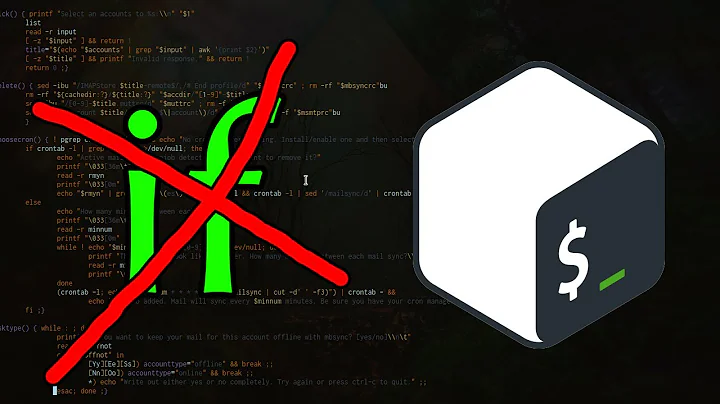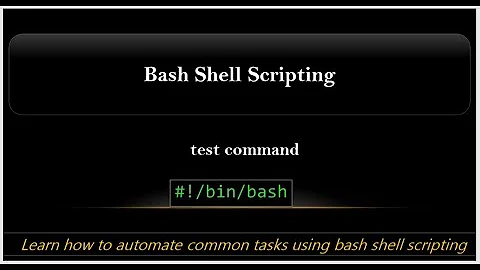Is there an "in" operator in bash/bourne?
Solution 1
You can use case ... esac
$ cat in.sh
#!/bin/bash
case "$1" in
"cat"|"dog"|"mouse")
echo "dollar 1 is either a cat or a dog or a mouse"
;;
*)
echo "none of the above"
;;
esac
Ex.
$ ./in.sh dog
dollar 1 is either a cat or a dog or a mouse
$ ./in.sh hamster
none of the above
With ksh, bash -O extglob or zsh -o kshglob, you could also use an extended glob pattern:
if [[ "$1" = @(cat|dog|mouse) ]]; then
echo "dollar 1 is either a cat or a dog or a mouse"
else
echo "none of the above"
fi
With bash, ksh93 or zsh, you could also use a regular expression comparison:
if [[ "$1" =~ ^(cat|dog|mouse)$ ]]; then
echo "dollar 1 is either a cat or a dog or a mouse"
else
echo "none of the above"
fi
Solution 2
There is not an "in" test in bash, but there is a regex test (not in bourne):
if [[ $1 =~ ^(cat|dog|mouse)$ ]]; then
echo "dollar 1 is either a cat or a dog or a mouse"
fi
And usually written using a variable (less problems with quoting):
regex='^(cat|dog|mouse)$'
if [[ $1 =~ $regex ]]; then
echo "dollar 1 is either a cat or a dog or a mouse"
fi
For an older Bourne shell you need to use a case match:
case $1 in
cat|dog|mouse) echo "dollar 1 is either a cat or a dog or a mouse";;
esac
Solution 3
Using a case is fine and well if you have a fixed set of pets you want to match against. But it won't work if you need to build the pattern in runtime, as case doesn't interpret alternation from within expanded parameters.
This will match only the literal string cat|dog|mouse:
patt='cat|dog|mouse'
case $1 in
$patt) echo "$1 matches the case" ;;
esac
You can, however, use a variable with the regular expression match. As long as the variable isn't quoted, any regex operators within it have their special meanings.
patt='cat|dog|mouse'
if [[ "$1" =~ ^($patt)$ ]]; then
echo "$1 matches the pattern"
fi
You could also use associative arrays. Checking if a key exists in one is the closest thing to an in operator that Bash gives. Though the syntax is a bit ugly:
declare -A arr
arr[cat]=1
arr[dog]=1
arr[mouse]=1
if [ "${arr[$1]+x}" ]; then
echo "$1 is in the array"
fi
(${arr[$1]+x} expands to x if arr[$1] is set, empty otherwise.)
Solution 4
You could use a case statement in an if test, but the code would look a bit hairy:
if case "$1" in (cat|dog|mouse) true ;; (*) false; esac; then
printf '"%s" is one of cat, dog or mouse\n' "$1"
else
printf '"%s" is unknown\n' "$1"
fi
or slightly shorter,
if ! case "$1" in (cat|dog|mouse) false; esac; then
printf '"%s" is one of cat, dog or mouse\n' "$1"
else
printf '"%s" is unknown\n' "$1"
fi
This is using an case clause just to do the pattern matching for the if clause. It introduces an unnecessary true/false test.
It's better to just use case:
case "$1" in
cat|dog|mouse)
printf '"%s" is one of cat, dog or mouse\n' "$1"
;;
*)
printf '"%s" is unknown\n' "$1"
esac
Don't do this:
is_one_of () {
eval "case $1 in ($2) return 0; esac"
return 1
}
if is_one_of "$1" 'cat|dog|mouse'; then
printf '"%s" is one of cat, dog or mouse\n' "$1"
else
printf '"%s" is unknown\n' "$1"
fi
or this:
is_one_of () (
word=$1
shift
IFS='|'
eval "case $word in ($*) return 0; esac"
return 1
)
if is_one_of "$1" cat dog mouse; then
printf '"%s" is one of cat, dog or mouse\n' "$1"
else
printf '"%s" is unknown\n' "$1"
fi
... because you're just adding more dangerous cruft, just to be able to use an if statement in your code in place of a perfectly reasonable case statement.
Solution 5
grep approach.
if echo $1 | grep -qE "^(cat|dog|mouse)$"; then
echo "dollar 1 is either a cat or a dog or a mouse"
fi
-qto avoid any output to screen (quicker to type than>/dev/null).-Efor extended regular expressions(cat|dog|mouse)aspects needs this.^(cat|dog|mouse)$matches any lines starting (^) with cat, dog or mouse ((cat|dog|mouse)) followed by end of line ($)
Related videos on Youtube
mrjayviper
Updated on September 18, 2022Comments
-
mrjayviper over 1 year
I’m looking for an “in” operator that works something like this:
if [ "$1" in ("cat","dog","mouse") ]; then echo "dollar 1 is either a cat or a dog or a mouse" fiIt's obviously a much shorter statement compared to, say, using several "or" tests.
-
mrjayviper almost 6 yearsany reason for the double brackets? Thanks again!
-
smw almost 6 years@mrjayviper the double brackets are an extended test construct - AFAIK the regex operator
=~isn't valid inside the POSIX single-bracket test -
 Sergiy Kolodyazhnyy almost 6 years@steeldriver Only
Sergiy Kolodyazhnyy almost 6 years@steeldriver Only[is POSIX, but[[is extended feature of bash, ksh ( apparently it's originated from there, and zsh.caseexample is most POSIX of all, though -
 Sergiy Kolodyazhnyy almost 6 yearsWouldn't that be better to split case into function call and evaluate exit status inside the if statement?
Sergiy Kolodyazhnyy almost 6 yearsWouldn't that be better to split case into function call and evaluate exit status inside the if statement? -
 Kusalananda almost 6 years@SergiyKolodyazhnyy And let the pattern be an argument to the function? It would have to do an
Kusalananda almost 6 years@SergiyKolodyazhnyy And let the pattern be an argument to the function? It would have to do anevalof thecasestatement in that case, and it would be even more prone to errors. -
 done almost 6 years@StéphaneChazelas Since at least bash 4.1-alpha there is no need to set extglog explicitly. From bash changes: s. Force extglob on temporarily when parsing the pattern argument to the == and != operators to the [[ command, for compatibility.
done almost 6 years@StéphaneChazelas Since at least bash 4.1-alpha there is no need to set extglog explicitly. From bash changes: s. Force extglob on temporarily when parsing the pattern argument to the == and != operators to the [[ command, for compatibility. -
 done almost 6 years@steeldriver The $1 in
done almost 6 years@steeldriver The $1 incase "$1" indoes not need to be quoted, no word splitting nor pathname expansion are performed in that token. -
smw almost 6 years@Cyrus thanks for the regex catch - StéphaneChazelas thanks for the improvements, the extended glob in particular




